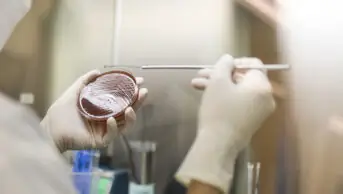
Charles Shearn
A no-deal Brexit could see the UK lose access to an EU-wide online tracker of infectious diseases and antimicrobial resistance (AMR), Dame Sally Davies, the chief medical officer (CMO) for England, has told The Pharmaceutical Journal.
Asked if the UK would still be able to access — and contribute to — The European Centre for Disease Prevention and Control’s Surveillance Atlas of Infectious Diseases following a no-deal Brexit, she said that at the present time “we actually don’t know”.
Davies was speaking to The Pharmaceutical Journal at the Royal Pharmaceutical Society’s (RPS) Science and Research Summit, held at County Hall, London, on 8 February 2019, at which she spoke on the UK’s AMR strategy from 2019 and beyond.
The government had sought to retain access, Davies said, and was “working very hard to try and make sure that we can”.
“But it’s not resolved, and it won’t be resolved until we know what form of Brexit we’re having.”
The Surveillance Atlas of Infectious Diseases uses data from EU member states to provide updates on reported and confirmed cases of infectious disease, and on AMR to specific antibiotics. Under the current Brexit withdrawal agreement, the UK will “cease to be entitled to access any network, any information system and any database established on the basis of [EU] law” at the end of any transition period agreed for leaving the EU. A no-deal Brexit could see UK access lost as early as 30 March 2019, the day after Brexit is scheduled to happen.
Davies also said that pharmaceutical companies were “queuing up” to join a new pilot funding model where they would be rewarded for developing new antimicrobials, rather than paid by sales volume. The pilot, Davies said, will “look at how we value antibiotics, and pay for the value. It’s very experimental”, adding that the UK was the first country in the world to pilot market incentives for new antimicrobials.
The government announced its five-year plan for tackling AMR in January 2019, which announced the proposal for “delinking” payments to drug companies from the volume of antibiotics sold and instead “basing the payment on a [National Institute for Health and Care Excellence]-led assessment of the value of the medicines and supporting good stewardship”.
On the morning of the RPS Summit it was also announced that Davies would step down as England’s CMO in October 2019, to take up the role of Master of Trinity College, Cambridge. Reflecting on her term as CMO, Davies said that there was “much more awareness [of AMR] now. We’ve completed our first five-year plan very effectively.
“I’m really pleased with how we’ve brought all the professions together — look at the importance of pharmacists, and all the recognition the profession gets — to plan the vision for 20 years, and what we are going to do over the next five. I think it’s a really good piece of work.”
The Department for Health and Social Care did not wish to comment on Brexit arrangements.


